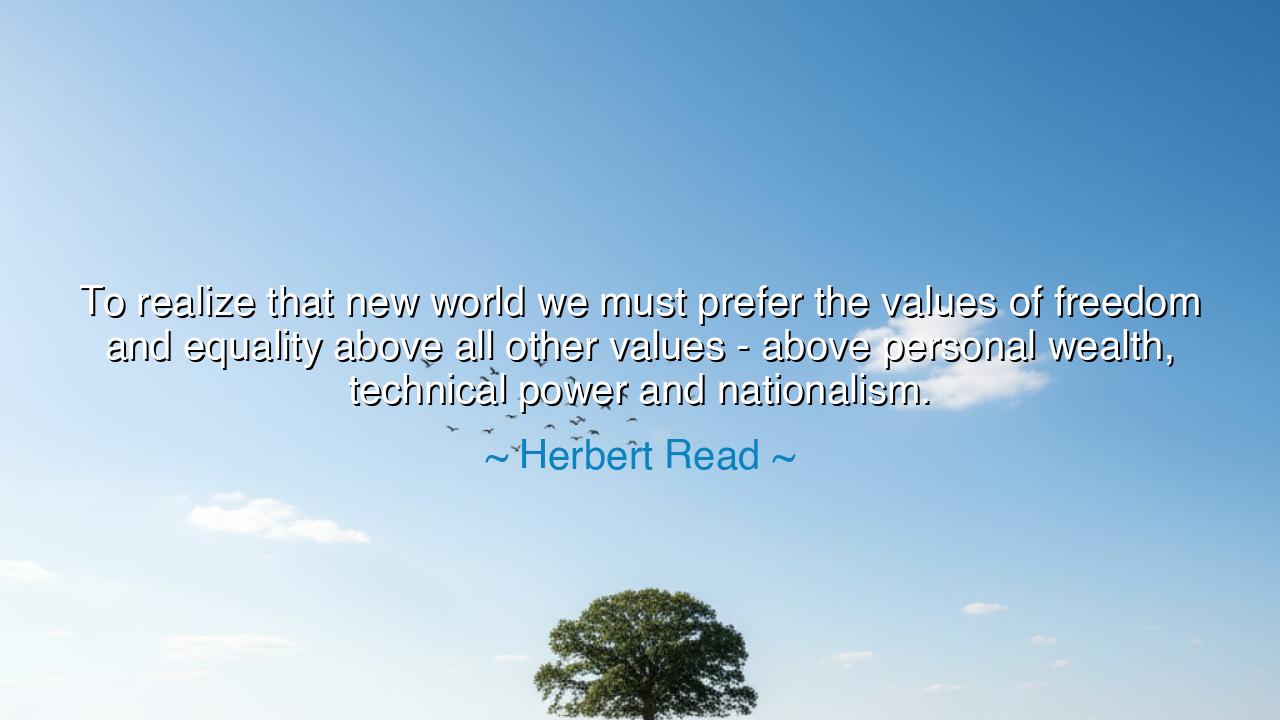
To realize that new world we must prefer the values of freedom
To realize that new world we must prefer the values of freedom and equality above all other values - above personal wealth, technical power and nationalism.






Herbert Read’s words strike like the tolling of a great bell: “To realize that new world we must prefer the values of freedom and equality above all other values—above personal wealth, technical power and nationalism.” In this saying he reminds us that the destiny of humanity is not forged in the gold of treasure, nor in the might of machines, nor in the banners of nations. Instead, it is shaped in the sacred balance between liberty and justice, where each soul is free and yet bound to the dignity of all. The new world he envisions is not of glittering towers nor armies in triumph, but of a society rooted in the eternal laws of compassion and fairness.
The ancients knew the danger of misplaced values. Empires that rose upon conquest and wealth found themselves undone by the very forces they glorified. Rome, with all its splendor, perished when power became greed and when nationalism drowned out its republican virtues. Babylon’s walls, which seemed impregnable, fell when kings valued pride over justice. Read’s words echo the old lesson: no civilization can endure if it builds upon the shifting sands of wealth, power, or national pride. Only the rock of freedom and equality can bear the weight of a lasting world.
Consider the story of Mahatma Gandhi and India’s struggle for independence. Gandhi had no armies, no technical power, no treasury of wealth. What he possessed was the conviction that freedom and equality outweighed all else. He rejected the intoxication of nationalism when it turned toward violence, for he believed the new India must be born not in blood but in truth and nonviolence. His vision reminds us of Read’s: that the true revolution is not in the machinery of war or the pursuit of riches, but in the awakening of conscience. And so, with little more than salt marches and prayers, Gandhi moved an empire and birthed a nation.
Read’s warning about technical power is especially prophetic. The modern world has built engines greater than any before—machines that can cross oceans, reach the stars, or destroy nations in an instant. Yet what good is power without wisdom? What good is invention if it enslaves rather than liberates? The ancients spoke of fire: a gift that warms and cooks, but also burns and consumes if unrestrained. So too with technology—without the guiding hand of freedom and equality, it becomes the tool of the few over the many, the master over the servant, the tyrant over the free.
When he speaks of nationalism, Read warns us against a love that curdles into pride and division. To love one’s people is noble, but to exalt one nation above humanity is to sow the seeds of endless war. Twice in the last century, the world was torn apart because nations placed their banners above the dignity of man. The graves of millions cry out with the same truth that Read proclaims: that equality among peoples must come before the hunger for national glory. The earth is wide enough for all, yet narrow when pride makes neighbors into enemies.
The lesson for us is clear: to build a new world, we must set our compass by freedom and equality. Seek not wealth as your highest






AAdministratorAdministrator
Welcome, honored guests. Please leave a comment, we will respond soon